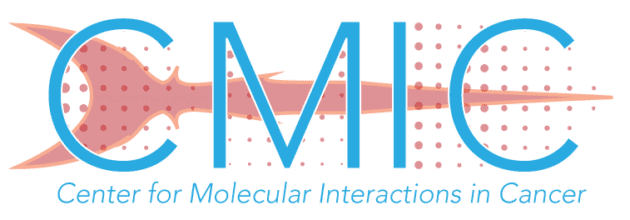
Welcome to the NIH-funded Center for Molecular Interactions in Cancer (CMIC). The CMIC is a part of the Centers for Biomedical Research Excellence (COBRE) award mechanism supported by the Institutional Development Award (IDeA) program through National Institute of General Medical Sciences (NIGMS). Robert Eoff, Ph.D., serves as the Director of the Center and Fen Xia, M.D., Ph.D., serves as Deputy Director. The CMIC has an Administrative Core, two Research Cores – a Structural Biology Core led by Eric Enemark, Ph.D., and a Biomolecular Interactions Core led by Kevin Raney, Ph.D. – and up to five research projects led by junior investigators.
The CMIC was established in 2024 upon receipt of the NIH COBRE Phase 1 award (1P20GM152281-01). The main goal of the CMIC is to advance research focused on understanding the molecular basis of cancer and cancer therapies. Advances in the instrumentation and techniques used to determine the three-dimensional properties of biomolecules have enabled researchers in a variety of disciplines to investigate complexes and interactions that were previously intractable. Structural biology and complementary biophysical approaches have the potential to advance many aspects of biomedical research. A key theme of research in the CMIC is the use of structural biology and biophysics to study the biology underlying different cancers and to promote development of new therapeutics.
The overall goal of the multidisciplinary CMIC is to enhance the research infrastructure and build capacity for rigorous, cutting-edge science to be performed at UAMS, while also increasing the ability of junior investigators to compete for extramural awards from the NIH and other agencies. Our long-term goal is to create a community of researchers all working towards discoveries that will have a meaningful and positive impact on our understanding malignant disease, ultimately helping improve outcomes and treatment options for Arkansans suffering from cancer.
How to Acknowledge the CMIC
“Research reported in this [publication, release] was supported (in whole or in part) by the National Institute of General Medical Sciences of the National Institutes of Health under Award Number P20GM152281. The content is solely the responsibility of the authors and does not necessarily represent the official views of the National Institutes of Health.”
For abstracts, a short note “Supported by a grant from the NIH/NIGMS – 1P20GM152281” will suffice.
Contact
Robert L. Eoff, Ph.D.
Biomedical Research Center 1
325 Jack Stephens Drive
Little Rock, AR 72210
Telephone: 501-686-8343
Email: rleoff@uams.edu
